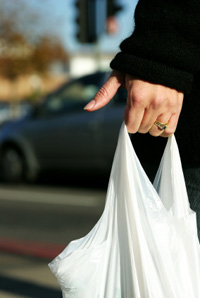
Smart retail packaging is now:
– Sustainable
– Recyclable
– Economical
– Made locally
We are becoming less and less of a throw-away society. But what about those plastic t-sacks – are they still the scourge of the earth? No. Ironically, the lowly t-sack is now one of the leaders in the race for sustainable packaging and environmentally conscious change.
The real sustainable bag
Most of our Polyethylene (PE) plastic retail bags, and especially T-Sacks have been reformulated in a cooperative effort between Nashville Wraps, our suppliers, and various plastic industry associations. Today’s T-sacks and other domestic plastic bag styles are chocked full of sustainable engineering. Remember that real sustainability is a combination of Social, Environmental and Economic components. And no, we are not growing corn to make t-sacks either… we don’t need to. A few reasons why PE bags are the eco-friendly choice:
Social: Our society is becoming more and more environmentally responsible. Recycling is a large part of this change. When I go to the grocery store I bring my t-sacks for recycling, and millions of others do now as well.
In less than two short years, the awareness and practice of bringing plastic bags back to stores for recycling has become a cultural shift. Since PE plastics are highly recyclable that makes for a sustainable supply chain which is working. Cultural change occurs in society when the masses are well informed of both problems and sensible solutions as opposed to being mandated by local governments on a witch hunt (see link at bottom of the article). The free market will decide and has is our point.
Economic: Plastic grocery and retail bags are made of lightweight PE (Polyethylene), one of the most cost-effective products to recycle. From a purely economic perspective, PE can be easily recycled into new bags and a myriad of other economical products. Like any industry, the recycling industry must generate enough revenue to be profitable, otherwise it will fold. The challenge has been making the cultural switch to recycling, but now that gap is being bridged.
Environmental: The environmental benefits of PE are two-fold. First, the more of us who recycle bags, the more we nullify the negative impact of plastic bags as litter, and the better job we do of keeping them out of the streets, waterways and landfills. Second, PE rates very well in its overall lifecycle analysis, considering the water, energy, and pollutants required to produce, transport, collect and recycle it.
T-Sacks and other light-gauge bags compare favorably to today’s common reusable totes from an environmental impact perspective. Although there has been no widely accepted documentation on this, shipping bags across the ocean is a poor use of energy. So the claim of environmental superiority for domestic PE can be made because it has one of the lowest carbon footprints and transportation costs associated with it.
Keeping it local: The domestic PE bag business is still one of America’s largest manufacturing industries. The raw material is made from a waste product of North American natural gas. Since both the raw materials and the bags themselves are made in the United States, not only can we can support American jobs and our own economy, we can reduce the dependence on foreign oil and labor.
Our major supplier of plastic bags is a U.S. company with a plastic recycling division. All bags purchased by NW from this supplier contain recycled plastic, many as high as 100% recycled. We can buy imported bags that contain recycled content, but it makes little sense to sell bags made from recycled plastic collected in China, or plastic collected in the U.S. and shipped to China, and then back to the U.S. again.
As Paul Harvey says, “And now…the rest of the story.”
There is always more to the story than what you might read in a headline. Products become popular because they offer overall benefits that are superior to the products they replace. The popularity of plastic bags is a classic example of this.
Ironically, however, while plastic bags have taken the brunt of environmental attacks, the facts say they are superior from a green standpoint in many key areas such as energy usage, water, landfill reduction, recyclability, reusability, etc. The green movement is still young and evolving, so many answers are as yet unpublished.
At Nashville Wraps we continue to provide a wide array of packaging solutions to meet the growing demand for real environmentally friendly packaging. We believe that continuing to promote recycling, offering products made from recycled materials, and supporting domestic producers is how we can have the greatest impact now.
Robby Meadows, Nashville Wraps
Next time we will talk about those resuable bags and traditional recycled paper bags; both have their place.
Other articles on this subject:
Plastic Bags are easiest to recycle;
Paper Bags versus Plastic Bags – Real Numbers;
Cheap plastic bags again! … but from Iranian oil?; Small choices are significant
